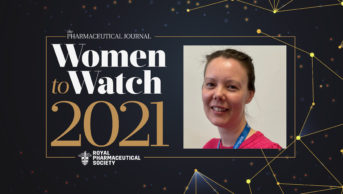
Natasha Callender / Shutterstock.com
For Natasha Callender, the COVID-19 pandemic was a stark reminder of the inequalities that exist within the healthcare system.
“COVID-19 amplified inequalities of all kinds, but initially we saw the majority of the deaths were amongst minority ethnic professionals, then we saw that playing out in the community,” she explains.
“It highlighted that there are people within our communities who have layers of inequality.”
It was this realisation that inspired Callender to use her position at that time, as a clinical fellow for England’s chief pharmaceutical officer, to help lead some difficult discussions at the heart of NHS England about ways to make pharmacy practice more inclusive.
As her nominator said: “Her willingness to share her own experiences, and lead discussions on a range of sensitive and critical topics, including racism and health inequality, has acted as a catalyst for many others to explore and develop their understanding and position.”
The result was the Joint National Plan for Inclusive Pharmacy Practice, produced in conjunction with the Royal Pharmaceutical Society, the Association of Pharmacy Technicians UK (APTUK) and others, which set out actions to address equality, diversity and inclusion across healthcare in England.
If we really want patients to have the best outcomes we have to ensure that we understand the differences in our communities
Callender chaired the advisory group and helped to author the final document. “[If] we really want patients to have the best outcomes we have to ensure that we understand the differences in our communities,” she explains.
She is still in the early stages of her career, but her ability to think big has defined her from the beginning; while studying at King’s College London (KCL) it was a running joke among her fellow students that she would only stay in the profession for a maximum of five years before seeking pastures new.
After working in various ward-based hospital roles in Oxford and London, Callender returned to KCL in 2015 to complete a National Institute for Health Research-funded master’s studentship in supporting self-management of adult asthma.
The MSc led her on to a medicines optimisation role in Lewisham, south London, where she was carrying out complex polypharmacy medication reviews and deprescribing for frail, older housebound patients across primary and secondary care.
Her intelligent and analytical approach led to several projects on medication safety and prescribing of high-risk medicines, particularly disease-modifying antirheumatic drugs and direct oral anticoagulants, one of which was highly commended by the National Institute for Health and Care Excellence in 2020.
The project used the pharmacist-led information technology intervention for medication errors (PINCER) pharmacist-led IT system to reduce the risk of avoidable harm in prescribing and monitoring of oral methotrexate. Between December 2018 and May 2019, the total number of people prescribed oral methotrexate recommended to attend three-monthly blood monitoring appointments rose from 59% to 85%.
However, Callender was still keen to understand more about how to connect health policy with real change. This prompted her to apply for the clinical fellowship with the chief pharmaceutical officer through the Faculty of Medical Leadership and Management.
“I’ve not taken a very traditional career path at all. So for me it was an opportunity to bring all those skills together. I quite enjoyed doing my high impact work. So I thought let me learn how that’s done on a larger scale.”
She is helping others follow in her footsteps, by bringing together leaders from across the profession, including the General Pharmaceutical Council and the Royal Pharmaceutical Society, to create a new model for clinical academic career pathways for pharmacists.
“We don’t have a culture of research within our profession but yet we make loads of decisions based on evidence,” she explains.
“For me, it’s about developing a clinical academic pathway for pharmacists to do that.”
A pilot has already begun to test it, with five candidates in the first year. Callender’s work is changing the face of the pharmacy profession and we have not seen the last of it yet.
Panellist comments
“For me it was about the above and beyond and the bravery of the conversations – that element of being able to talk openly about your experiences.”
“Natasha has made a quantifiable impact on the profession with her focus on clinical academic careers, however it is the personal impact of her sharing of her lived experiences which sets her apart.”
“She has demonstrated the bravery we need in the profession to change the culture.”
Meet the rest of The Pharmaceutical Journal’s Women to Watch 2021 here


